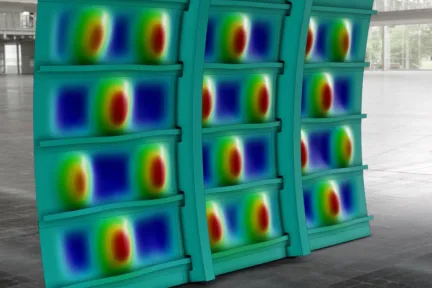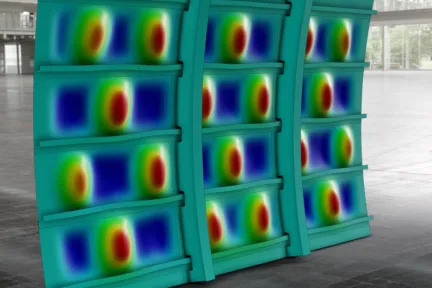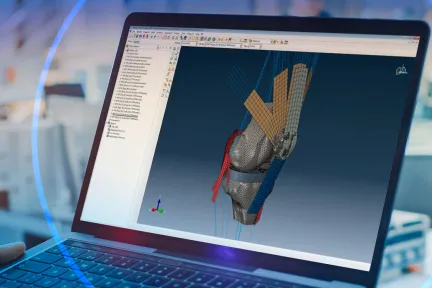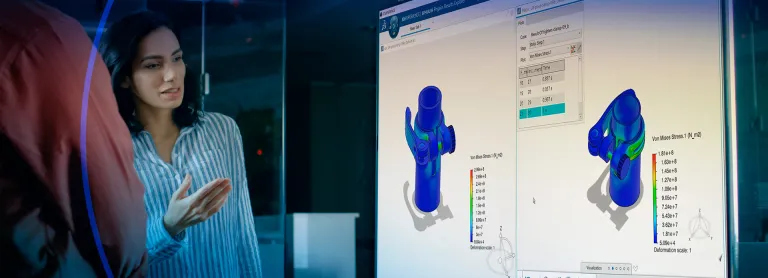Abaqus
Finite Element Analysis for Mechanical Engineering and Civil Engineering
General-Purpose Finite Element Analysis Software
Abaqus reaches the desk of engineering analysts as a robust Finite Element Analysis (FEA) software. It is designed to exploit the true generality of the theoretical potential of the method without imposing any unnecessary limitations. Abaqus assists engineers in simulating complex real-world problems for various industries and relies on it for advanced engineering simulations.
With an extensive library of element types, it can model nearly any geometry. Abaqus has an equally extensive library of material models. Using this library, you can simulate stress and deformation in isotropic and anisotropic metals at varying temperatures and strain rates.
Beyond metals, Abaqus can simulate:
- Rubber and polymers
- Reinforced concrete
- Glass and ceramics
- Crushable or resilient foam
- Geotechnical materials like soil and rock
However, Abaqus offers more than just stress analysis. Abaqus simplifies the simulation of conductive and convective heat transfer, mass diffusion, acoustics, piezoelectricity and electrochemistry independently, sequentially coupled, or fully coupled with stress analyses.
Abaqus is uniquely powerful due to its modularity and flexibility. You can model any physically reasonable combination of elements, materials, procedures and loading sequences. With Abaqus, you can use any material with virtually any element (for composite, in a layer of an element). Abaqus enables you to bring your ideas to reality by allowing you to create and simulate your models without limitations. You can subject your models to static or dynamic loading histories.
- Finite Element Simulation of Large Models
- Nonlinear Simulation Excellence
- Ease of Use for Complex Problems
Finite Element Simulation of Large Models
With increasing design complexity, the need for a detailed understanding of design intricacies becomes pivotal, leading to large simulation models. The Finite Element Analysis system must allow users to run large problems efficiently using available computer resources. Abaqus takes advantage of the high-performance features of modern computers, so the model size limitations rarely prevent you from realizing an adequate simulation.
Users appreciate being able to meet schedules because the code runs large, complex jobs through to completion. Realistic models quickly expose how meticulously the code designers handled the details. Abaqus holds up under the rigors of real-life, large model requirements.
Nonlinear Simulation Excellence
Analysts must consider nonlinear responses as an essential part of a simulation. Lightweight structures buckle; in accident scenarios, they could collapse. Some important modern materials — like rubbers and plastics — are too soft to simulate based on linearized deformation. Often, the designer wants to take full advantage of the ductility and toughness of the materials available.
Many design problems involve contact. It could range from Hertz contact in bearing design to general sliding contact between a part and the die/mold used to form it. Or between two parts, each undergoing substantial deformation. Abaqus can address these types of complex problems. It has led to its worldwide reputation as the tool of choice for simulations where nonlinearity dominates the response.
Ease of Use for Complex Problems
Abaqus is popular as an advanced analysis code specializing in production analysis. It has a comprehensive suite of capabilities that are straightforward to learn. It is modular and has simple, consistent and intuitive problem definition rules that relieve you of artificial and frustrating limitations. Users can model geometry as closely as needed, define material behaviors associated with various components of the model and simulate a sequence of events of concern.
Abaqus is designed to ease complex tasks. One of the best examples is automatic time stepping in nonlinear static, dynamic and heat transfer problems: Abaqus chooses and continuously adjusts the time increments automatically. This feature alone has permitted many users to perform simulations that would have been impossible otherwise. Users can tackle realistic simulations with the confidence of success and assurance of meeting the design schedules.
Research organizations use Abaqus extensively because of its versatility and user-defined extensibility. Its great success arises from its acceptance in the design analysis community as a general analysis tool that provides convenience in routine simulations and greatly extends the range of possible simulations.
Abaqus has a proven record of success in the largest and most complex problems, which distinguishes it. Abaqus is a pleasure to work with for relatively straightforward applications. For complex problems, Abaqus shines as the most trusted tool that provides reliable answers.
Discover the Modules
Solution Technology for Linear and Nonlinear Finite Element Analysis
Solution Technology for Highly Nonlinear Transient Events
Complete Solutions for Realistic Simulation
Complete Solution for Abaqus Finite Element Modeling, Visualization, and Process Automation
Associative Interfaces Between Abaqus and CAD Systems
Advanced Model Build for Ply and Fiber Materials
Advanced Knee Implant Analyses and Simulation
Crush Simulation for Laminated Composites
Start Your Journey
Explore the technological advancements, innovative methodologies, and evolving industry demands that are reshaping the world of Design & Engineering Simulation. Stay a step ahead with SIMULIA. Discover now.
FAQs About FEA software
Also Discover
Learn What SIMULIA Can Do for You
Speak with a SIMULIA expert to learn how our solutions enable seamless collaboration and sustainable innovation at organizations of every size.
Get Started
Courses and classes are available for students, academia, professionals and companies. Find the right SIMULIA training for you.
Get Help
Find information on software & hardware certification, software downloads, user documentation, support contact and services offering








